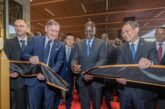
Senior Hotel Experts Debate Turkey’s Growth, Innovation And Investment At CATHAY
Almasalla Travel News – Istanbul – Four Chief Executive Officers of global hotel chains debated the way forward for hotel brands at the CATHIC conference in Istanbul and a panel of investors examined the potential for international investment in Turkey’s tourism infrastructure. Delegates also heard positive insights into Turkey’s economic outlook.
CEOs GIVE THE BIGGER PICTURE
Omer Isvan, President of Servotel Corporation led a panel discussion that included how best the global hotel brands can develop their portfolios in Turkey, how brands can improve their offering and whether branded resorts are planned for Turkey.
HOW TO GROW BRANDS: FRANCHISING VS MANAGEMENT
Angela Brav, CEO Europe for IHG said that in Turkey there are plenty of people wanting to invest in hotel projects, so IHGs strategy is to develop management contracts with the right local investor partners.
Wolfgang Neuman, president & CEO of Rezidor Hotel Group was keen to focus efforts on the mid-market brand Park Inn by Radisson, and to target Generation Y who are now entering this market. He sees this as a major opportunity for Radisson, with up to 15 Park Inn by Radisson properties to be developed in the coming years, including one under construction at Ataturk Airport.
Eric Danziger, CEO of Wyndham Hotel Group, which has 7400 properties across 15 brands in its portfolio, the majority of which are franchised, believes that brands should be developed to the markets where they are needed, and that all of Wyndham’s 15 brands are not necessary in all markets.
The relative merits of franchise or management contracts as a means for the big chains to develop their global reach was examined, with Wyndham Group being the franchise champion on the panel. Danziger asserted that the key to successful franchising is to select the right franchise partners, then trust them to do it right, while helping, teaching and training them to meet brand standards. To underline this point, Danziger today announced the signing of an exclusive development agreement between Wyndham Hotel Group and İlbak Turizm İşletmeleri Ve Yatirim A.Ş. for 20 Super 8® hotels in Turkey over the next 10 years.
At the other end of the spectrum, Robert Gaymer Jones, of Sofitel was clear that they would keep the management model and would not consider franchise opportunities. He pointed out that Sofitel partners with investors and owners who are not in the hotel business, and do not have the hotel management expertise.
At IHG, while 80 per cent of its portfolio is franchised, the majority of these properties are in the mid- scale and economy brands, and that for upper-scale hotels, franchising was not a focus for development. Angela Brav said that in IHGs partner in Turkey, the Ceylan family manage the hotels very well, and IHG would not do better. In other markets, where IHG partners are not in the hotel management business, IHG pursues management contracts.
Wolfgang Neumann said Rezidor Hotel Group has 20 to 25 per cent of its hotels on franchise agreements, and that while franchising can be a faster way to growth, this is because investment obligations stay with the owners, not because franchising is simply a matter of rubber stamping deals – he stressed that all hotels must deliver the brand promise.
INVENTION VS INNOVATION
Eric Danziger, CEO of Wyndham Hotel Group warned against confusing innovation with invention: ’Steve Jobs did not invent the phone – he made it better’.
He cautions against innovation for its own sake – believing instead that there was still room to do things better. He said rather than inventing new ways of delivering WiFi, hotels could focus first on making sure existing WiFi offerings actually work. He stressed the key to success was to deliver on promises to the consumer.
LEISURE TOURISM AND RESORT HOTELS
Omer Isvan asked the panel what the major brands are doing to develop resort properties in Turkey, given that Turkey’s tourism market is dominated by the leisure tourism sector, but most international brands are focused on city-centre hotels.
Angela Brav said that while IHG is developing resort hotels in many markets, the challenge in Turkey is transportation, and particularly airlift. Until there are more affordable flights into key resort locations, and economic conditions can deliver better return on investment, the focus would continue to be on city centre hotels.
Robert Gaymer Jones indicated that Sofitel will focus on urban locations first, and that while it is developing resort hotels in Bali and Morocco, in Turkey they would first look to have a flagship property in Istanbul. Only then would the look to develop a resort in Bodrum.
Wolfgang Neumann believes that Turkey is dynamic and an evolving market and that its tourism growth potential is not just in the leisure sector. He highlighted the growing meetings, incentive and events market, with Istanbul as the powerhouse of this growth.
TURKEY’S INVESTMENT OUTLOOK
Christoph Harle led a discussion with Martin Kandrac, MD of Blackstone, Elif Egeli Nisanci of BLG Capital and Ulf Pettersson of Amstar Global Partners which examined the opportunities and barriers to international investors backing hotel projects in Turkey.
Elif Egeli Nisanci believes there are opportunities out there – but only for the right hotel in the right location. She cautioned that some projects are decided more by the owner’s ego than hard reality. She also pointed out that Turkish investors have high liquidity, have in depth knowledge of the market and are able to act fast, which can put international investors at a disadvantage.
Martin Kandrac said that Blackstone had looked at a number of Turkish projects, but as their strategy is to buy existing properties, and not to enter development deals, opportunities to date have been limited. He added that Blackstone is getting to know the Turkish market, and recognizes the need to have local partners who understand how things work in Turkey.
Ulf Pettersson indicated that there are often significant price expectations gaps between Turkish owners and international investors, a point that was echoed by Kandrac. Egeli Nisanci said this was often a result assumptions rather than reality. Perceptions of Turkey as an emerging market persist, when in fact Turkey’s banking system, economic growth and government are more developed and stable than foreign investors perceive.
TURKEY, THE 5TH BRIC ECONOMY
Echoing the hotel sector experts, economic and business guru Daniel Thorniley, President of DT-Global Business Consulting said that the key to success in business is long term relationships, and this is particularly true in Turkey. He said many companies get this wrong, they don’t stand by their local suppliers or partners through the difficult times as well as the good. But those companies that do build and maintain strong local partnerships will always be the winners.
Thorniley stated that by all the economic indicators, Turkey stands out as having much economic potential, and that it deserves to be recognized as the 5th BRIC Economy. This analysis is based on the fact that Turkey finance and banks that were not badly affected by the banking crisis. Turks are the 4th happiest consumers in all of Europe, Investment trends in Turkey are positive and domestic demand is strong. Turkey’s current account is improving and inflation is moving downwards.

From an investment perspective, across Central Europe and the CIS, 66 per cent of new growth is coming from Russia and Turkey, and in Central Europe including Turkey, 82 per cent of foreign direct investment is in Poland and Turkey.
Thorniley said that while some have criticized the Turkish Central Bank, he believes they have done a very good job of managing economic conditions, and that Turkey is proving to be a very good market indeed.
Among other positive economic drivers, he noted that more women are leaving the home to work, and that this will drive up spending on children, home durables and other products. Salaries in Turkey have risen in recent years, particularly for middle and senior managers, and in many multinational companies, the MD for Turkey could earn more than his counterparts in Germany, France or Scandinavia.
But key to all of this economic good news for Turkey is that, in his opinion, unlike the rollercoaster economy that Turkey experienced in the past, the outlook for Turkey is for sustainable growth and economic development. It is likely, he concluded, that over the next 5-10 years, Turkey will experience some of the strongest GDP growth in all of Continental Europe.
The Turkey & Neighbours Hotel Investment Conference (CATHIC) will run from May 29 -30, 2013 at Marmara Taksim, Istanbul and is co-organised by Bench Events and Questex Media, which also manages the Russia and CIS Hotel Investment Conference, Arabian Hotel Investment Conference, International Hotel Investment Forum Asia Pacific and International Hotel Investment Forum Berlin.





